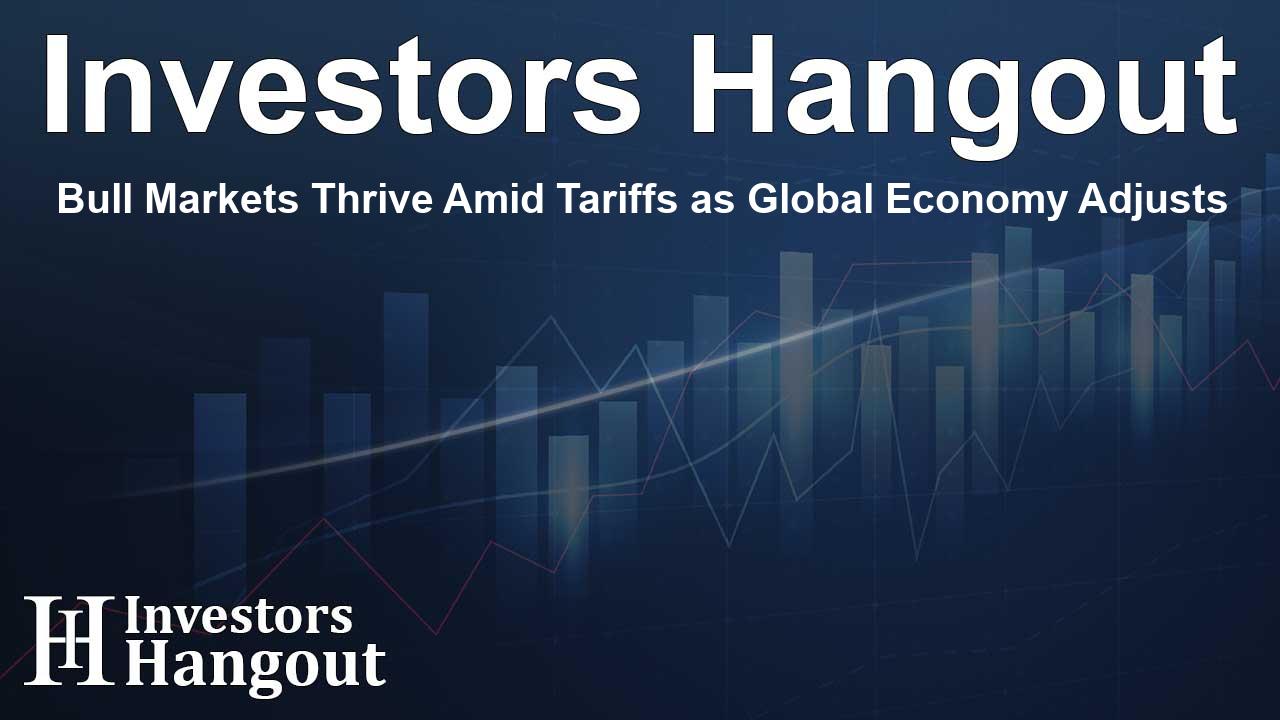Bull Markets Thrive Amid Tariffs as Global Economy Adjusts

Understanding the Global Bull Market
The global bull market has become particularly resilient, showing strength even in the face of increasing tariffs on key economies. As global economies tackle various issues, investors and analysts are eager to grasp what this dynamic means for future market conditions.
Market Trends and Observations
Recent trends indicate that the stock markets worldwide are gaining positive momentum, inspiring confidence among investors. Despite the backdrop of tariff announcements affecting various countries, notably Japan and South Korea, the overarching sentiment remains optimistic. This trend is predominantly fuelled by market anticipation of regulatory changes and economic measures that may positively impact the business landscape.
Key Observations from Current Market Data
- The overarching strength of the global bull market encourages optimism and mitigates the focus on negative factors such as tariffs.
- Despite looming tariffs, stock prices in South Korea have shown resilience, demonstrating a bullish inclination among investors.
Many equities have posted gains even after significant tariff announcements. Stocks in South Korea managed to rally, showcasing the market's confidence, which some attribute to the global bullish outlook. Notably, major ETFs such as the iShares MSCI South Korea ETF (EWY) reflect significant growth trajectories, outperforming benchmarks like the S&P 500.
Market Reactions to Tariff Changes
While one might expect tariff impositions to deter investment, the current scenario tells a different story. Following announcements regarding delays in tariff enforcement, the market responded positively. These extensions provided a buffer, allowing investors to reassess the situation rather than panic. Analysts speculate that this reaction underscores a broader market belief in the potential economic resilience amid these challenges.
Potential Risks and Considerations
- Despite the present optimism, investors should remain attentive to rising interest rates, which could introduce volatility in the market.
- A series of Treasury auctions is scheduled, with outcomes potentially influencing stock market directions significantly.
Focusing on upcoming Treasury auctions, experts are closely monitoring these events as a determinant of potential market shifts. If the sales yield favorable results, equity markets are likely to respond positively, continuing the upward trends. Conversely, disappointing auction outcomes could lead to declines, exemplifying the delicate balance of market dynamics at play.
Investment Strategies in a Bull Market
As a proactive investor, it’s crucial to establish an actionable strategy that aligns with the prevailing market conditions. With great momentum observed in notable stocks like Amazon (AMZN), Alphabet (GOOG), and Tesla (TSLA), understanding the flow of money into these equities can provide a significant edge. Investors are encouraged to gauge when the so-called 'smart money' enters the market, as this often precedes potential gains.
Exploring Asset Allocations
Notably, the gold market has gained attention, particularly the SPDR Gold Trust (GLD), which remains a popular choice among investors seeking safety amid market fluctuations. Additionally, the iShares Silver Trust (SLV) is another key asset, consistently showing resilience within the commodity sectors.
While sticking to traditional allocations—60% stocks and 40% bonds—may appeal to some, investors might consider flexible strategies involving high-quality bonds with shorter durations to minimize risk. These approaches suggest adapting with market conditions for optimized outcomes.
Conclusion: Looking Ahead
As we navigate the complexities of today's economic landscape, remaining informed and adaptive is crucial. Investors equipped with the right insights are poised to make decisions that not only protect their capital but also position them advantageously for future opportunities. With the bull market showing no significant signs of retreat, a calculated approach could lead to favorable outcomes in the anticipated economic adjustments.
Frequently Asked Questions
What factors are driving the current bull market?
The current bull market is driven by strong investor sentiment, resilience shown by key sectors, and positive market reactions to economic policies.
How do tariff changes impact stock prices?
Tariff changes can create uncertainty; however, markets can also react positively if investors believe that broader economic factors may benefit them.
What should investors focus on during Treasury auctions?
Investors should pay attention to the yield and demand during these auctions, as good results often correlate with bullish market reactions.
What are the best strategies in a bull market?
Effective strategies include focusing on high-quality stocks, monitoring sector momentum, and being adaptable in asset allocation.
Are commodities still a good investment amid market shifts?
Yes, commodities like gold and silver often act as a hedge against market volatility, making them a reliable investment during uncertain times.
About The Author
Contact Ryan Hughes privately here. Or send an email with ATTN: Ryan Hughes as the subject to contact@investorshangout.com.
About Investors Hangout
Investors Hangout is a leading online stock forum for financial discussion and learning, offering a wide range of free tools and resources. It draws in traders of all levels, who exchange market knowledge, investigate trading tactics, and keep an eye on industry developments in real time. Featuring financial articles, stock message boards, quotes, charts, company profiles, and live news updates. Through cooperative learning and a wealth of informational resources, it helps users from novices creating their first portfolios to experts honing their techniques. Join Investors Hangout today: https://investorshangout.com/
The content of this article is based on factual, publicly available information and does not represent legal, financial, or investment advice. Investors Hangout does not offer financial advice, and the author is not a licensed financial advisor. Consult a qualified advisor before making any financial or investment decisions based on this article. This article should not be considered advice to purchase, sell, or hold any securities or other investments. If any of the material provided here is inaccurate, please contact us for corrections.
